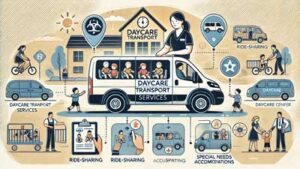Modern parents often struggle with rigid daycare schedules that don’t align with their demanding lifestyles. Flexible daycare timing services address this issue by offering adaptable solutions that cater to diverse scheduling needs. For instance, parents working shift-based jobs or those with non-standard hours—such as healthcare professionals or retail employees—can greatly benefit from extended hours or customizable drop-off and pick-up times.
One key reason parents should consider these services is the peace of mind they provide. Knowing that childcare is available when needed reduces the stress of last-minute schedule changes or unexpected delays. According to a 2023 survey by the Childcare Services Association, 68% of parents reported improved job performance when their daycare offered flexible timing options.
Another advantage is the ability to better plan family routines. For parents with young children, aligning daycare schedules with nap times, meal times, or older siblings’ school timings can make a world of difference. Flexible timing services ensure that each child’s unique routine is respected, fostering emotional stability and reducing stress for parents.
Lastly, for families sharing caregiving responsibilities between parents, grandparents, or babysitters, flexible timing bridges gaps and ensures consistency in the child’s daily care. This makes daycare timing services an essential option for parents looking to maintain balance in their work-life dynamics.
Flexible daycare timing services bring a host of benefits to parents, offering much-needed convenience and reducing the pressures of traditional schedules. One of the most significant advantages is the ability to choose a childcare schedule that fits specific family needs. Whether parents need early morning drop-offs, late evening pick-ups, or weekend care, flexible options cater to these demands, allowing parents to focus on their professional and personal priorities.
Financial efficiency is another benefit. Many daycares now offer hourly rates, part-time slots, or even pay-as-you-go models that help parents save money by only paying for the hours they use. This is especially advantageous for families where one parent works part-time, or for those who occasionally require childcare on short notice.
Additionally, daycare timing services provide parents with more control. Many centers use digital tools such as apps or online platforms to allow parents to customize their schedules, make updates, or monitor their child’s daily activities in real time. This transparency builds trust and strengthens the relationship between parents and daycare providers.
Finally, parents benefit emotionally from these services. Having access to flexible daycare options reduces the guilt or anxiety often associated with leaving their child in someone else’s care. It ensures that their children are cared for in a nurturing environment, even during non-traditional hours, helping parents feel more at ease while tackling their responsibilities.
Flexible daycare timing services don’t just benefit parents—they also allow daycare providers to improve the quality of care they offer to children. By accommodating varied schedules, daycares can cater to each child’s specific needs, ensuring that their time at the center is both productive and nurturing.
One way this works is through smaller, focused group sizes during non-peak hours. For example, children attending early morning or late evening sessions often receive more personalized attention because there are fewer children present. This allows educators to focus on tailored activities, whether it’s helping with homework, reading, or hands-on learning exercises.
Another benefit is the ability to design programs that align with a child’s natural schedule. For instance, some children may thrive in morning-focused programs where they can participate in creative and energetic activities, while others may benefit from quieter, structured sessions in the afternoon. Flexible daycare timing ensures that daycares can offer variety and personalization in their daily programming.
Moreover, accommodating flexible schedules helps build stronger relationships with parents. When daycare providers show a willingness to adapt to family needs, they earn trust and loyalty. This positive relationship encourages better communication between parents and staff, which ultimately results in better care for the children.
Flexible timing also promotes inclusivity. For children with special needs or unique routines, daycares can tailor care options, ensuring that no child is left out. These practices foster an environment where all children feel valued and supported, enhancing their overall development and well-being.
In today’s competitive childcare market, offering flexible daycare timing services gives centers a significant advantage. As more parents seek childcare solutions that fit their busy lifestyles, daycares that provide adaptable scheduling options stand out as innovative and family-friendly.
One major advantage is the ability to attract a broader client base. Flexible timing allows daycares to cater to parents with diverse needs, including those who work unconventional hours or only require care part-time. This expands the center’s reach and fills more time slots, maximizing both enrollment and revenue.
Daycare centers can also use flexible timing services to offer premium features, such as late-night care, weekend programs, or emergency drop-ins. These services can be priced at a higher rate, boosting profitability while meeting the unique demands of their community.
Furthermore, daycares that embrace technology in their flexible scheduling services—such as apps for booking, payment, or updates—can market themselves as modern and efficient. Parents value convenience, and a daycare that simplifies the process of managing childcare schedules will have a distinct advantage over competitors.
Lastly, flexible timing helps build a positive reputation. Word-of-mouth referrals from satisfied parents who appreciate the adaptability of these services can drive more enrollments. As families look for childcare providers that align with their values and schedules, flexible daycare timing services position daycares as trustworthy, accommodating, and ahead of the curve.
Flexible daycare timing services are transforming the childcare landscape by addressing the unique needs of modern families. By offering adaptable schedules, reducing stress for parents, and enhancing the quality of care for children, these services are a win-win for families and daycare centers alike. As the demand for flexibility continues to grow, embracing these options can help daycares thrive and create lasting value for their communities.





